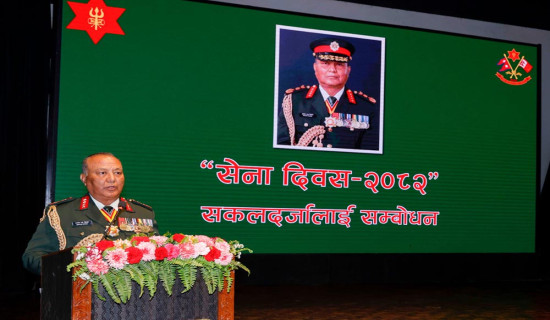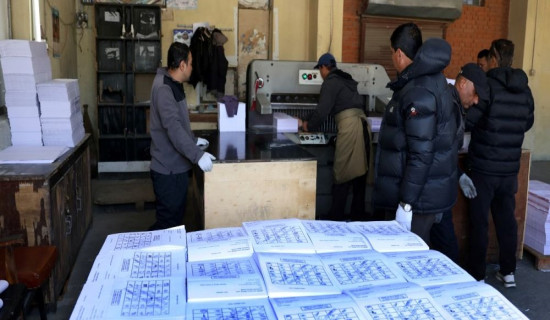- Saturday, 14 February 2026
Debate On Bidya's Return To Politics
When Former President of Nepal Bidya Devi Bhandari announced her intention to return to active politics last month, it set off a debate around whether it is appropriate for a former president to return to competitive politics. The incumbent leadership of the Communist Party of Nepal (UML) criticised her proposal as unethical and a debasement of the dignity of the presidency. However, sizable party members stood by her side, saying that it is perfectly normal for her to return to politics, given the precedence set by heads of state in other countries.
In the world, there are ample instances of the heads of state or government returning to competitive politics after completing their terms in office. The first such instance is considered to be the president of the USA, John Quincy Adams, who had contested a parliamentary election after losing the election for a second term. In recent times, Russian President Vladimir Putin had become Prime Minister during the presidency of Dimitry Medvedev after completing his two consecutive presidential terms in 2008. Even in Asia, legendary leader Lee Kuan Yew of Singapore had served as a senior minister after completing his term as prime minister. In this context, Bhandari's choice for returning to active party politics is neither against convention nor exceptional.
Disillusionment
The UML has a divided opinion on her re-entry. When she announced the relinquishment of her post-retirement privileges in favour of active politics, general members and the lower committees of the UML viewed it as an opportunity to rejuvenate the party organisations from the present state of disillusionment stemming from the weakening ideological base of the party and a flourishing transactional culture in the party hierarchy.
The party leadership, then, convened its central committee meeting, which decided that the former president's intention to return to active politics was inappropriate. Some leaders even appeared to think that Bhandari was adequately compensated and she should sit back enjoying the post-retirement privileges instead of showing any ambition for power hierarchy.
In sharp contrast, however, the general membership of the party views her comeback with a different perspective. They think that she is one of the few senior leaders of the party who carry the moral and ethical legacy of Madan Bhandari's ideology of People's Multi-party Democracy (PMPD). Therefore, Bhandairi's return to active politics is nothing more than her response to an inner call to step forward to defend the core value of PMPD and to stop it from being reduced to a theatrical tool.
It is stated that UML is losing popularity because of its inability to provide smart governance, rationalise the unprincipled power sharing between the ruling and the main opposition party, control corruption and create momentum in economic development. For lack of accountability and transparency in matters of corruption, the international community is losing interest in assisting Nepal in its development endeavours. The conduct of foreign policy does not appear to align with the need to shift global geopolitical reality. The successive elected governments have failed to reassure both the close neighbours with transparency and a credible road map to act as a bridge between them to facilitate cross-country economic mobility for mutual benefit.
In contrast with the image of the existing leadership, Bhandari bears an impressive profile as a patriotic and ethical leader who could reignite life in the demoralized party rank and file with her presence, help unify the splintered party and cash in on her good rapport with Nepal's neighbours for enhancing Nepal's diplomatic standing. She had relinquished her party membership to maintain a neutral, unbiased and non-partisan image of a president. It was necessary then. But after retirement, her quest for an active membership in the party is her undeniable democratic right.
Some senior party leaders are loudly thinking that her re-entry was necessary to restore the diminishing reputation of the party. The presence of a leader of Bhandari's stature could provide the UML a much-needed facelift, especially in the context of the upcoming general election of 2027. If it wants to achieve the lost popular support base that late Madan Bhandari built for the party, it should start to connect the broken strands of the emotional bonds within the party family. By keeping a renowned personality like Bhandari out in the cold, the UML will not be able to win over the true adherents of Madan Bhandari.
Controversy
The controversy raging around the re-entry of Bhandari into the UML has created a deep psychological rift within the party. If UML fails to take concrete steps to heal the wound and consolidate left unity by being more accommodating, institutionalising meritocracy, allowing free competition among leaders to rise in hierarchy and allowing constructive criticism and self-criticism as a weapon to correct erroneous decisions, it could face an unprecedented disaster in the 2027 election.
So the best advice to UML leadership at this moment is that welcoming Bhandari to the party is in its best interest. Her entry into the party will stem the wave of frustration, foster inner-party democracy and rekindle hope for career growth in the party. Most importantly, it will provide the party an ideological edge to take up the challenges of Mission 2084 (2027).
(Dr. Bharadwaj is former ambassador and former chairperson of Gorkhapatra Corporation. bharadwajnarad@gmail.com.)












-original-thumb.jpg)


